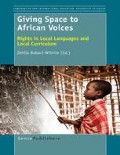Abstract
The language of instruction (LoI) policies of Uganda and Malawi provide an interesting landscape for the study of language in education in Africa. Ugandans and Malawians speak different mother languages, some closely related and others completely different from one another. However, English, introduced by the British, who ruled both countries for decades as colonial protectorates, is the language of power and privilege.
Access this chapter
Tax calculation will be finalised at checkout
Purchases are for personal use only
Preview
Unable to display preview. Download preview PDF.
References
Ahimbisibwe, P. (2013, August 17). Kiswahili dream drags on as government looks for funds. Saturday Monitor, Special Reports Section.
Babaci-Wilhite, Z. (2013). Local languages of instruction as a right to education for sustainable development. Sustainability, 5, 1994–2207.
Babaci-Wilhite, Z. (2012). A human rights-based approach to Zanzibar’s language-in-education policy. World Studies in Education, 13(2), 17–33.
Babaci-Wilhite, Z., & Geo-JaJa, M. A. (2011). A critique and rethink of modern education in Africa’s development in the 21st Century. Papers in Education and Development (PED). Nr. 30. Journal of the School of Education, University of Dar es Salaam, 133–154.
Baguma, R. (2013, October 24). Cabinet directs on promotion of Swahili. New Vision, National Section.
Bostad, I. (2012). Existential education and the quest for a new humanism: How to create disturbances and deeper thinking in schools and universities? Comparative Education Society in Europe, 19, 45–59.
Byakutaga, S., & Musinguzi, R. (2000). Developing Runyakitara as an area language. In K. Parry (Ed.), Language and Literacy in Uganda: Towards a sustainable reading culture. Kampala, Uganda: Fountain Publishers Ltd.
Chauma, A., Chimombo, M., & Mtenje, A. (1997). Introduction of vernacular languages in primary education: The Malawian Experience. In Proceedings of the LICCA Workshop in Dar es Salaam (pp. 37–46). Tanzania.
Kasozi, A. B. K. (2000). The failure to develop a national language in Uganda: A historical survey. In K. Parry (Ed.), Language and Literacy in Uganda: Towards a sustainable reading culture. Kampala, Uganda: Fountain Publishers Ltd.
Kagaba, P. (2000). Progress in promoting Kiswahili in Ugandan schools. In K. Parry (Ed.) Language and Literacy in Uganda: Towards a sustainable reading culture. Kampala, Uganda: Fountain Publishers Ltd.
Kayambazinthu, E. (2004). The language planning situation in Malawi. In R. B. Baldauf & R. B. Kaplan (Eds.), Language Planning and Policy in Africa, Vol. 1: Botswana, Malawi, Mozambique and South Africa. Buffalo, NY: Multilingual Matters Ltd.
Kazembe, B. (1996, May 22). Learning in the vernacular, my turn. The Nation.
Koffi, E. (2012). Paradigm shift in language planning and policy: Game-theoretic solutions. Boston, MA: De Gruyter Mouton.
Lin, A. M. Y. (2013). Breaking the hegemonic knowledge claims in language policy and education: ‘The global south as method’. In J. A. Shoba & F. Chimbutane (Eds.), Bilingual education and language policy in the global south. New York, NY: Routledge.
Mazrui, A. (1972). Cultural engineering and nation-building in East Africa. Evanston, IL: Northwestern University Press.
Nsibambi, R. (2000). A language policy for national integration: Facilitators and inhibitors. In K. Parry (Ed.), Language and Literacy in Uganda: Towards a sustainable reading culture. Kampala, Uganda: Fountain Publishers Ltd.
Rassool, N. (2007). Global issues in language, education and development: Perspectives from postcolonial countries. Buffalo, NY: Multilingual Matters Ltd.
Saukani, A. (1996, May 22). Vernacular non-starter, Letters to the Editor. The Nation.
Skutnabb-Kangas, T. (1994). Linguistic human rights: A perspective for bilingualism. In I. Ahlgren & K. Hyltenstam (Eds.), Bilingualism in deaf education. Hamburg: Signum.
Skutnabb-Kangas, T. (2000). Linguistic genocide in education or worldwide diversity and human rights? Mahwah, NJ: Lawrence Erlbaum Associates.
Ssekamwa, J. C. (1997). History and development of education in Uganda. Kampala, Uganda: Fountain Publishers Ltd.
Ssekamwa, J. C., & Lugumba, S. M. E. (2001). Development and administration of education in Uganda. Kampala, Uganda: Fountain Publishers.
Sure, K., & Ogechi, N. (2009). Linguistic human rights and language policy in the Kenyan education system. Addis Ababa, Ethiopia: Organisation for Social Science Research in Eastern and Southern Africa.
Tollefson, J. W. (1991). Planning language, planning inequality. Harlow: Longman Group.
Wright, S. (2004). Language policy and language planning: From nationalism to globalisation. New York, NY: Palgrave Macmillan
Author information
Authors and Affiliations
Editor information
Rights and permissions
Copyright information
© 2014 Sense Publishers
About this chapter
Cite this chapter
Gyagenda, I.S., Rajab-gyagenda, W.M. (2014). Examining Ugandan and Malawian Language of Instruction Policies From a Linguistic Human Rights Perspective. In: Babaci-Wilhite, Z. (eds) Giving Space to African Voices. Comparative and International Education. SensePublishers, Rotterdam. https://doi.org/10.1007/978-94-6209-734-6_9
Download citation
DOI: https://doi.org/10.1007/978-94-6209-734-6_9
Publisher Name: SensePublishers, Rotterdam
Online ISBN: 978-94-6209-734-6
eBook Packages: Humanities, Social Sciences and LawEducation (R0)

